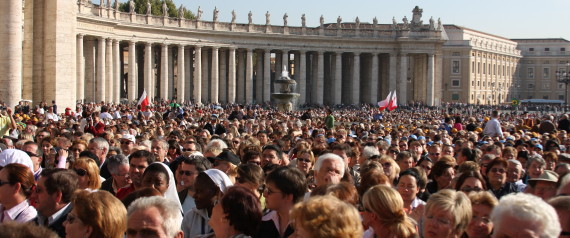
Can the Pope's Letter Create a "Tipping Point" on Climate Change?
Posted: Updated:
When climate scientists refer to "tipping points" it is usually bad news -- a moment beyond which elevated levels of greenhouse gas emissions will result in extreme weather and catastrophic damage to life upon this planet. Pope Francis' encyclical on the environment may be seen as another "tipping point" -- towards ensuring that communities of faith take up the moral challenge to preserve and protect creation.
Francis' letter, at once poetic as well as analytical, encourages readers to begin by contemplating nature's beauty and complexity. In this regard, the encyclical quoted a 2003 pastoral letter on the environment by the bishops of Canada, "From panoramic vistas to the tiniest living form, nature is a constant source of wonder and awe. It is also a continuing revelation of the divine."
The pope's encyclical is extremely long, reaching almost 200 pages. It covers a wide range of topics, such as water, biodiversity loss, the decline in the quality of human life, global inequality, the need for "ecological conversion" (first stated by his predecessor John Paul II in 1990) and even "political love." Already in the United States, criticism of the Pope has appeared from Republican candidates for the presidency as well as conservative commentators (well before they had read the document.)
Yet the Pope's encyclical presents several challenges worthy of attention.
A Moral Challenge
Francis believes that "authentic human development has a moral character." And he uses the strongest condemnation a religious leader can communicate by referring to "attacks on nature" as sinful.
The Pope's encyclical advances the moral argument away from some traditional theologies, which sternly interpreted the Genesis passages as giving license for humans to "dominate" the entire created order. It is instructive that the encyclical does not employ the "stewardship frame;" that is, it does not place the human over creation but more adequately sees human beings as part of creation's web of life.
The word "stewardship" only appears once in the entire document -- and then it is referring to another citation. The Pope asks that the biblical texts be "read in their context, with an appropriate hermeneutic." He understands that "a misguided anthropocentrism leads to a misguided lifestyle" and also leads to" inappropriate interpretations of the Bible."
A Challenge to International Solidarity
One would expect a man from the Global South (where his church is growing) to be sensitive to the need for international development and just relations. Francis understands that "The same mindset which stands in the way of making radical decisions to reverse the trend of global warming also stands in the way of achieving the goal of eliminating poverty. A more responsible overall approach is needed to deal with both problems: the reduction of pollution and the development of poorer countries and regions."
This Pope is a critic of unrestrained capitalism's "deified market," acknowledges the need to change "models of development" and recognizes the "ecological debt" owed to poor countries.
But the greater responsibility to act lies upon those countries, like Canada, which developed their own economies by the unrestrained burning of fossil fuels. "There is a need for common and differentiated responsibilities... the countries which have benefited from a high degree of industrialization, at the cost of enormous emissions of greenhouse gases, have a greater responsibility for providing a solution to the problems they have caused."
A Challenge to Canadians
Canadians must not stop at changing light-bulbs or recycling household waste -- important as these activities remain. "Self-improvement on the part of individuals will not by itself remedy the extremely complex situation facing our world today... Social problems must be addressed by community networks and not simply by the sum of individual good deeds... The ecological conversion needed to bring about lasting change is also a community conversion."
Francis believes that "a true ecological approach always becomes a social approach; it must integrate questions of justice in debates on the environment, so as to hear both the cry of the earth and the cry of the poor." Thus a suitable response to the encyclical might be for Canadian Catholics to demand a federal poverty reduction plan with "green" policy sensitivities from candidates to federal Parliament.
Francis notes that "it is remarkable how weak the international responses have been" to the climate crisis to date. Canada has often been criticized for blocking progress on international agreements to address climate change, and the recently announced target our government will bring to the table at the COP 21 negotiations in Paris this December is reported to be the weakest among all G-7 nations.
The Pope discusses the need for a "replacing" fossil fuel use and encourages renewable energy -- policy options that Canadians should encourage our governments to adopt.
Canadian faith communities will soon be asked to collaborate in developing and publishing a pastoral statement on climate change, poverty, and Indigenous rights. The only time a similar proposal was advanced, in October 2011, the Canadian Conference of Catholic Bishops declined to sign.
Has the Pope now provided a tipping point to which his flock will respond?


No comments:
Post a Comment